Shama Naz Islam
FedDiSC: A Computation-efficient Federated Learning Framework for Power Systems Disturbance and Cyber Attack Discrimination
Apr 07, 2023



Abstract:With the growing concern about the security and privacy of smart grid systems, cyberattacks on critical power grid components, such as state estimation, have proven to be one of the top-priority cyber-related issues and have received significant attention in recent years. However, cyberattack detection in smart grids now faces new challenges, including privacy preservation and decentralized power zones with strategic data owners. To address these technical bottlenecks, this paper proposes a novel Federated Learning-based privacy-preserving and communication-efficient attack detection framework, known as FedDiSC, that enables Discrimination between power System disturbances and Cyberattacks. Specifically, we first propose a Federated Learning approach to enable Supervisory Control and Data Acquisition subsystems of decentralized power grid zones to collaboratively train an attack detection model without sharing sensitive power related data. Secondly, we put forward a representation learning-based Deep Auto-Encoder network to accurately detect power system and cybersecurity anomalies. Lastly, to adapt our proposed framework to the timeliness of real-world cyberattack detection in SGs, we leverage the use of a gradient privacy-preserving quantization scheme known as DP-SIGNSGD to improve its communication efficiency. Extensive simulations of the proposed framework on publicly available Industrial Control Systems datasets demonstrate that the proposed framework can achieve superior detection accuracy while preserving the privacy of sensitive power grid related information. Furthermore, we find that the gradient quantization scheme utilized improves communication efficiency by 40% when compared to a traditional federated learning approach without gradient quantization which suggests suitability in a real-world scenario.
FeDiSa: A Semi-asynchronous Federated Learning Framework for Power System Fault and Cyberattack Discrimination
Mar 28, 2023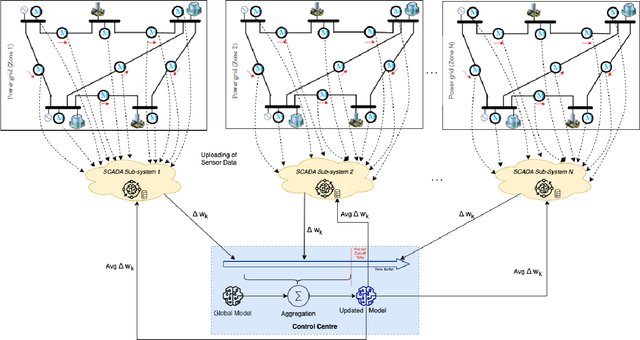

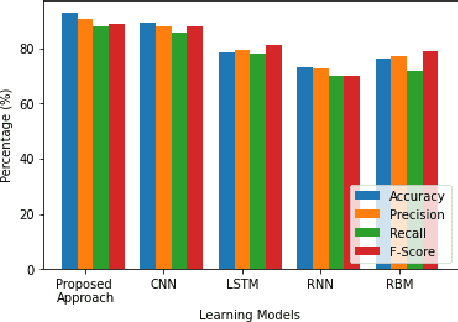
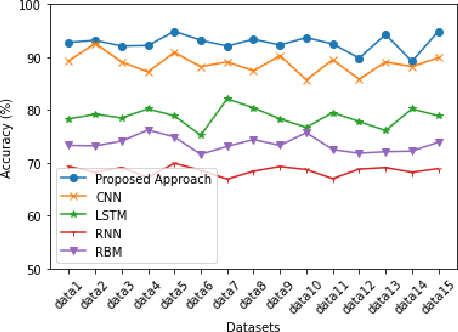
Abstract:With growing security and privacy concerns in the Smart Grid domain, intrusion detection on critical energy infrastructure has become a high priority in recent years. To remedy the challenges of privacy preservation and decentralized power zones with strategic data owners, Federated Learning (FL) has contemporarily surfaced as a viable privacy-preserving alternative which enables collaborative training of attack detection models without requiring the sharing of raw data. To address some of the technical challenges associated with conventional synchronous FL, this paper proposes FeDiSa, a novel Semi-asynchronous Federated learning framework for power system faults and cyberattack Discrimination which takes into account communication latency and stragglers. Specifically, we propose a collaborative training of deep auto-encoder by Supervisory Control and Data Acquisition sub-systems which upload their local model updates to a control centre, which then perform a semi-asynchronous model aggregation for a new global model parameters based on a buffer system and a preset cut-off time. Experiments on the proposed framework using publicly available industrial control systems datasets reveal superior attack detection accuracy whilst preserving data confidentiality and minimizing the adverse effects of communication latency and stragglers. Furthermore, we see a 35% improvement in training time, thus validating the robustness of our proposed method.
A Secure Federated Learning Framework for Residential Short Term Load Forecasting
Sep 29, 2022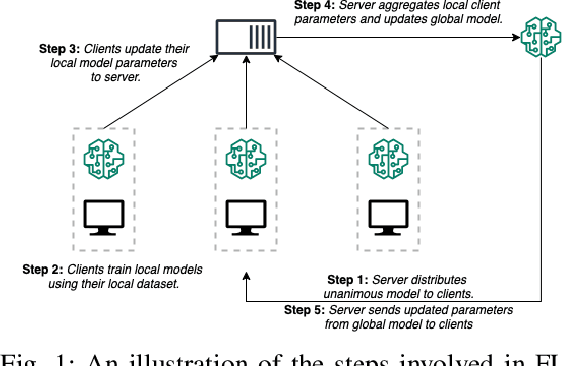
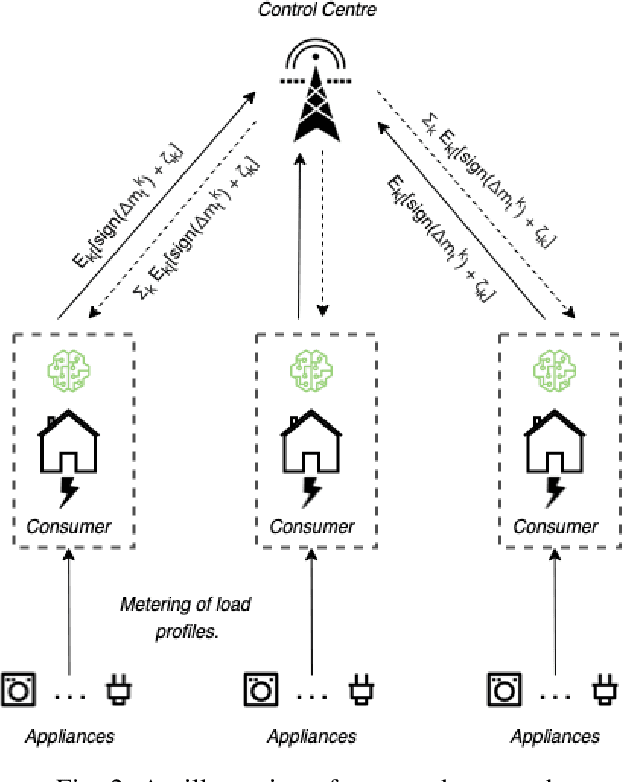
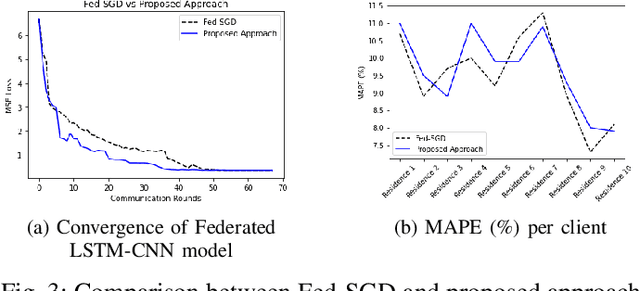

Abstract:Smart meter measurements, though critical for accurate demand forecasting, face several drawbacks including consumers' privacy, data breach issues, to name a few. Recent literature has explored Federated Learning (FL) as a promising privacy-preserving machine learning alternative which enables collaborative learning of a model without exposing private raw data for short term load forecasting. Despite its virtue, standard FL is still vulnerable to an intractable cyber threat known as Byzantine attack carried out by faulty and/or malicious clients. Therefore, to improve the robustness of federated short-term load forecasting against Byzantine threats, we develop a state-of-the-art differentially private secured FL-based framework that ensures the privacy of the individual smart meter's data while protect the security of FL models and architecture. Our proposed framework leverages the idea of gradient quantization through the Sign Stochastic Gradient Descent (SignSGD) algorithm, where the clients only transmit the `sign' of the gradient to the control centre after local model training. As we highlight through our experiments involving benchmark neural networks with a set of Byzantine attack models, our proposed approach mitigates such threats quite effectively and thus outperforms conventional Fed-SGD models.
A Bayesian Deep Learning Technique for Multi-Step Ahead Solar Generation Forecasting
Mar 21, 2022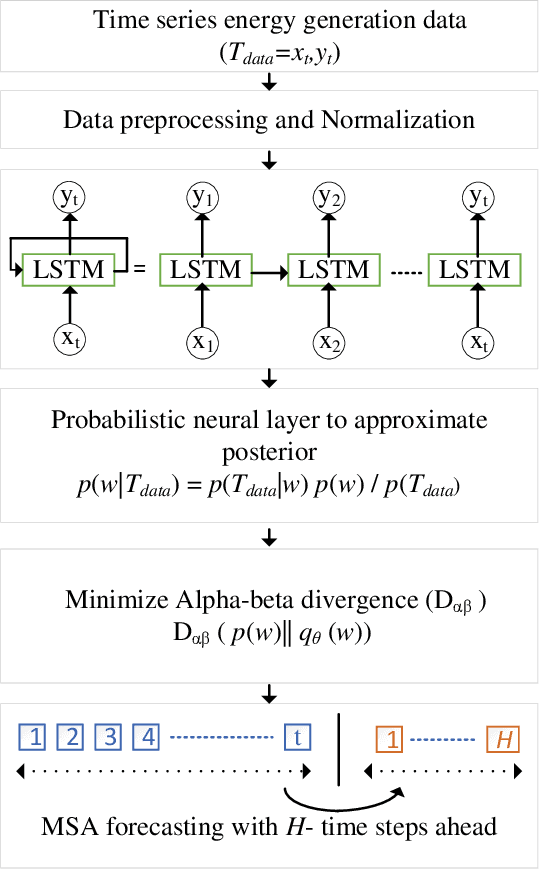
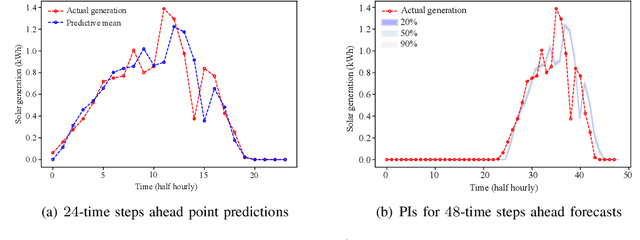


Abstract:In this paper, we propose an improved Bayesian bidirectional long-short term memory (BiLSTM) neural networks for multi-step ahead (MSA) solar generation forecasting. The proposed technique applies alpha-beta divergence for a more appropriate consideration of outliers in the solar generation data and resulting variability of the weight parameter distribution in the neural network. The proposed method is examined on highly granular solar generation data from Ausgrid using probabilistic evaluation metrics such as Pinball loss and Winkler score. Moreover, a comparative analysis between MSA and the single-step ahead (SSA) forecasting is provided to test the effectiveness of the proposed method on variable forecasting horizons. The numerical results clearly demonstrate that the proposed Bayesian BiLSTM with alpha-beta divergence outperforms standard Bayesian BiLSTM and other benchmark methods for MSA forecasting in terms of error performance.
FedREP: Towards Horizontal Federated Load Forecasting for Retail Energy Providers
Mar 01, 2022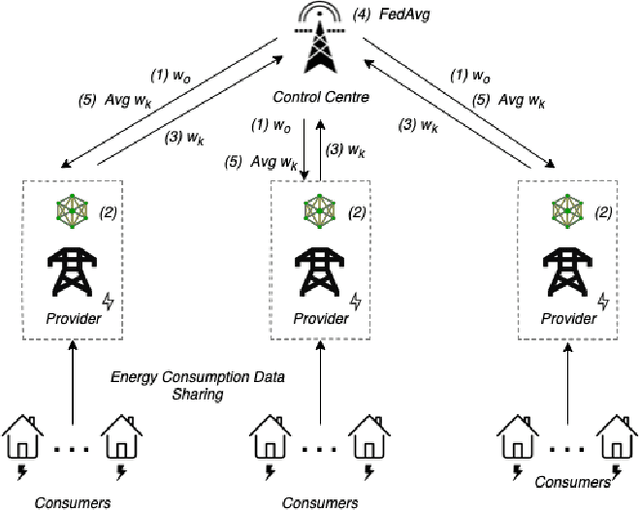

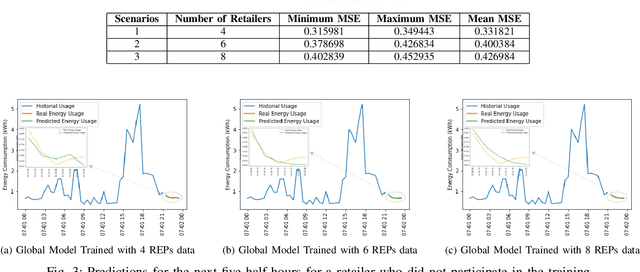
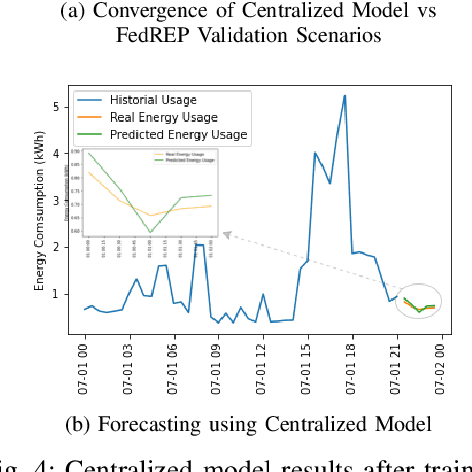
Abstract:As Smart Meters are collecting and transmitting household energy consumption data to Retail Energy Providers (REP), the main challenge is to ensure the effective use of fine-grained consumer data while ensuring data privacy. In this manuscript, we tackle this challenge for energy load consumption forecasting in regards to REPs which is essential to energy demand management, load switching and infrastructure development. Specifically, we note that existing energy load forecasting is centralized, which are not scalable and most importantly, vulnerable to data privacy threats. Besides, REPs are individual market participants and liable to ensure the privacy of their own customers. To address this issue, we propose a novel horizontal privacy-preserving federated learning framework for REPs energy load forecasting, namely FedREP. We consider a federated learning system consisting of a control centre and multiple retailers by enabling multiple REPs to build a common, robust machine learning model without sharing data, thus addressing critical issues such as data privacy, data security and scalability. For forecasting, we use a state-of-the-art Long Short-Term Memory (LSTM) neural network due to its ability to learn long term sequences of observations and promises of higher accuracy with time-series data while solving the vanishing gradient problem. Finally, we conduct extensive data-driven experiments using a real energy consumption dataset. Experimental results demonstrate that our proposed federated learning framework can achieve sufficient performance in terms of MSE ranging between 0.3 to 0.4 and is relatively similar to that of a centralized approach while preserving privacy and improving scalability.
False Data Injection Threats in Active Distribution Systems: A Comprehensive Survey
Nov 28, 2021


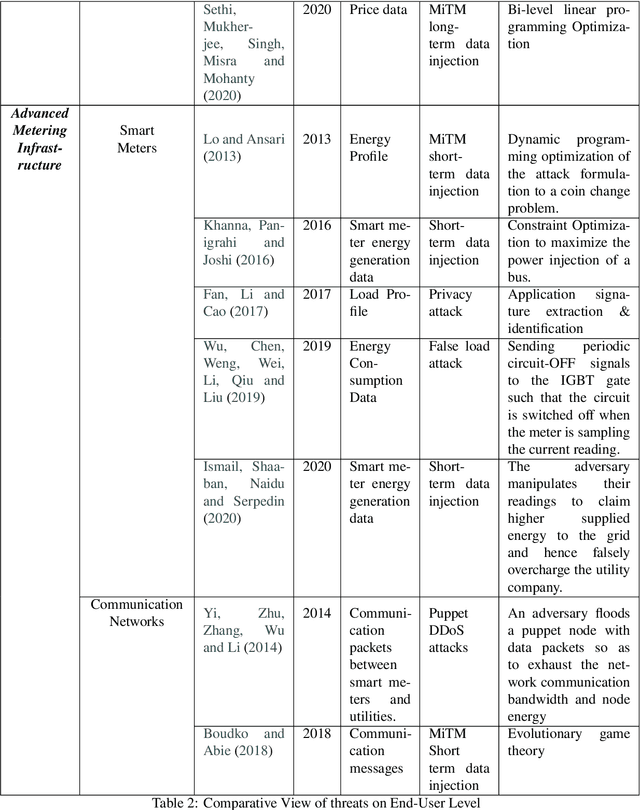
Abstract:With the proliferation of smart devices and revolutions in communications, electrical distribution systems are gradually shifting from passive, manually-operated and inflexible ones, to a massively interconnected cyber-physical smart grid to address the energy challenges of the future. However, the integration of several cutting-edge technologies has introduced several security and privacy vulnerabilities due to the large-scale complexity and resource limitations of deployments. Recent research trends have shown that False Data Injection (FDI) attacks are becoming one of the most malicious cyber threats within the entire smart grid paradigm. Therefore, this paper presents a comprehensive survey of the recent advances in FDI attacks within active distribution systems and proposes a taxonomy to classify the FDI threats with respect to smart grid targets. The related studies are contrasted and summarized in terms of the attack methodologies and implications on the electrical power distribution networks. Finally, we identify some research gaps and recommend a number of future research directions to guide and motivate prospective researchers.
A VAE-Based Bayesian Bidirectional LSTM for Renewable Energy Forecasting
Mar 24, 2021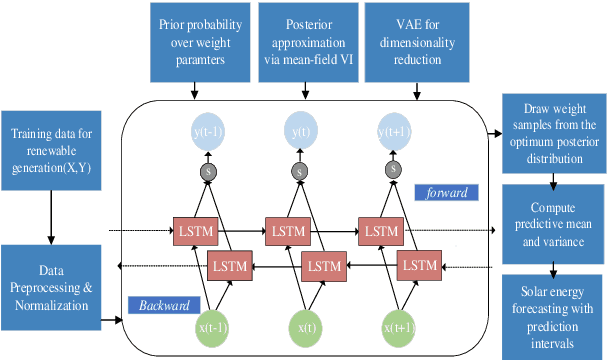

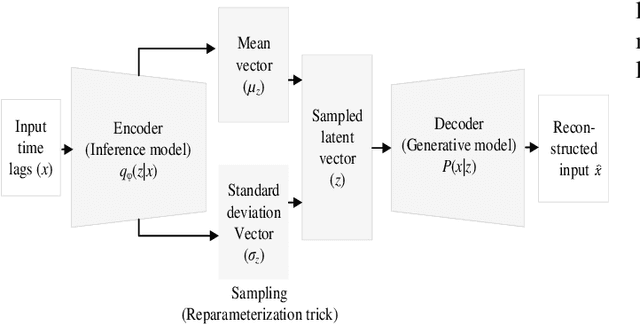
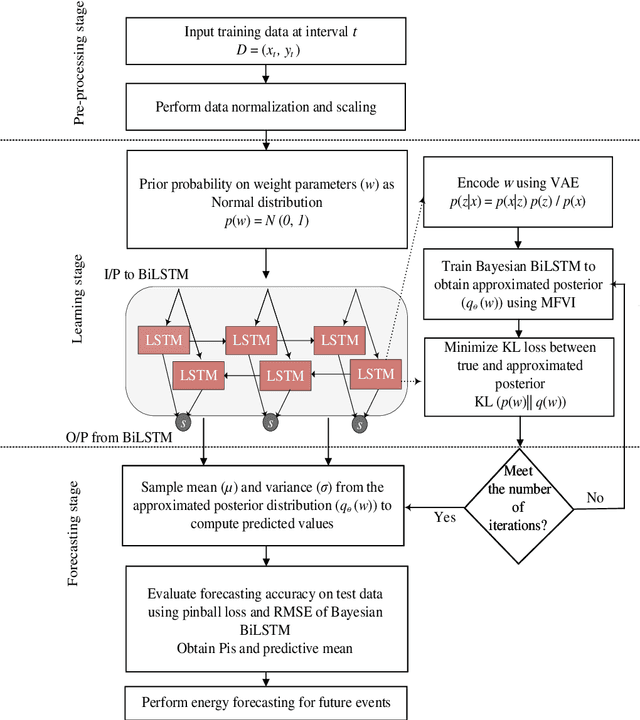
Abstract:The advancement in distributed generation technologies in modern power systems has led to a widespread integration of renewable power generation at customer side. However, the intermittent nature of renewable energy pose new challenges to the network operational planning with underlying uncertainties. This paper proposes a novel Bayesian probabilistic technique for forecasting renewable power generation by addressing data and model uncertainties by integrating bidirectional long short-term memory (BiLSTM) neural networks while compressing the weight parameters using variational autoencoder (VAE). Existing Bayesian deep learning methods suffer from high computational complexities as they require to draw a large number of samples from weight parameters expressed in the form of probability distributions. The proposed method can deal with uncertainty present in model and data in a more computationally efficient manner by reducing the dimensionality of model parameters. The proposed method is evaluated using pinball loss, reconstruction error, and other forecasting evaluation metrics. It is inferred from the numerical results that VAE-Bayesian BiLSTM outperforms other probabilistic deep learning methods in terms of forecasting accuracy and computational efficiency for different sizes of the dataset.
Energy Forecasting in Smart Grid Systems: A Review of the State-of-the-art Techniques
Nov 25, 2020

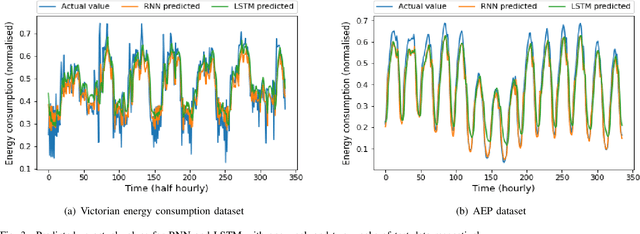

Abstract:Energy forecasting has a vital role to play in smart grid (SG) systems involving various applications such as demand-side management, load shedding, optimum dispatch, etc. Managing efficient forecasting while ensuring the least possible prediction error is one of the main challenges posed in the grid today, considering the uncertainty and granularity in the SG data. This paper presents a comprehensive and application-oriented review of state-of-the-art forecasting methods for SG systems considering the different models and architectures. Traditional statistical and machine learning-based forecasting methods are extensively investigated in terms of their applicability to energy forecasting. In addition, the significance of hybrid methods and data pre-processing techniques for better forecasting accuracy is also highlighted. A comparative case study using the Victorian electricity consumption benchmark and American electric power (AEP) datasets is conducted to analyze the performance of different forecasting methods. The analysis demonstrates higher accuracy of the recurrent neural network (RNN) and long-short term memory (LSTM) methods when sample sizes are larger and hyperparameters are appropriately tuned. Furthermore, hybrid methods such as CNN-LSTM are also highly effective to deal with long sequences in energy data.
 Add to Chrome
Add to Chrome Add to Firefox
Add to Firefox Add to Edge
Add to Edge